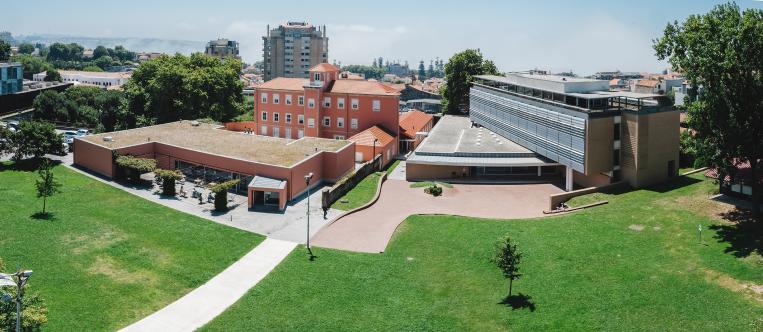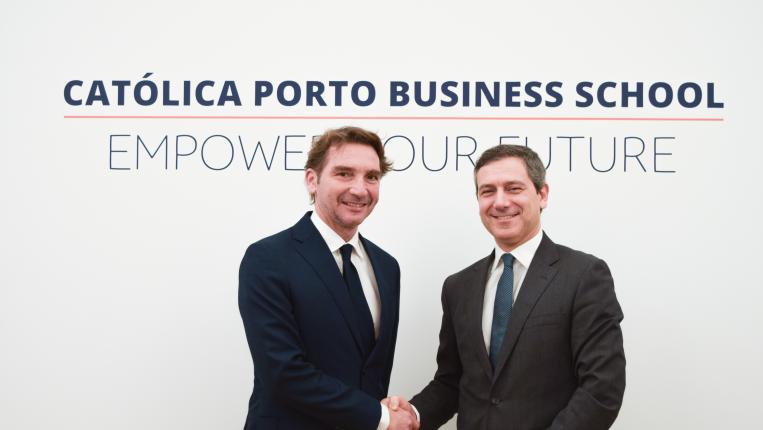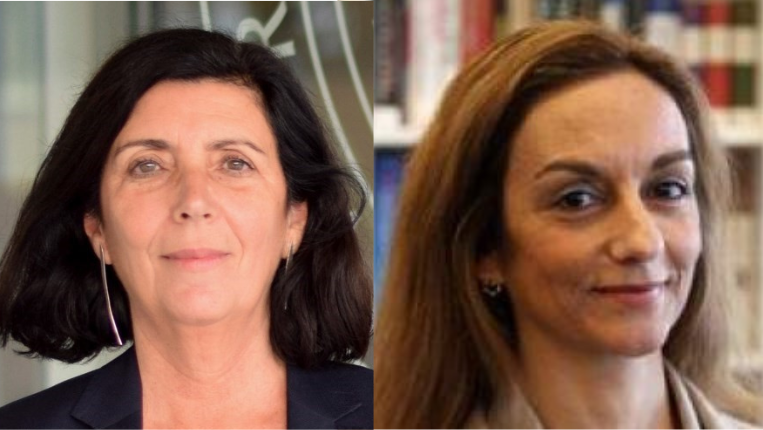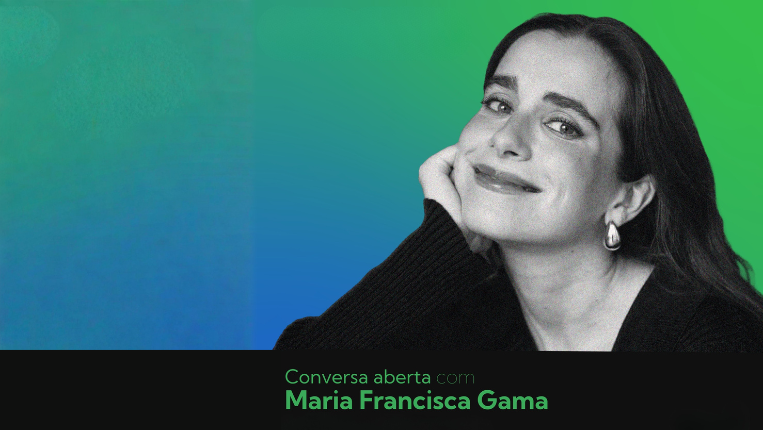
The School’s core activities are organised into the following main areas:
1. Teaching & Learning. Each of the three types of programmes offered by the School – undergraduate, graduate, and executive education/MBAs – is supervised by a School’s Board member. Each programme has an academic director, responsible for the academic and pedagogical coordination of the programme.
2. Service & Social Responsibility. The School has a significant number of initiatives related to service and social responsibility that are organic. Consulting services to the external community are provided by the School’s consulting unit (CEGEA).
3. Global Education. The School promotes the concept of Global Education, which looks at society as a multidimensional, complex and interconnected system, influenced by economic, cultural, political and environmental forces worldwide, and facing major ethics and sustainability challenges.
4. Faculty. Faculty is organised in two academic departments – Management and Economics.
These areas are supported by a set of Professional Services. The School has a number of consultation/deliberation bodies, including the Scientific and Pedagogical Councils, an Academic Advisory Board and a Societal Advisory Board.
The School Board
The Board of the Católica Porto Business School consists of a Dean, João Pinto (Executive Education, Corporate Engagement, and Fundraising), a Vice-Dean, Paulo Alves (Staff, Management Control, Accreditations and Ranking, and Master Programmes) and four Associate Deans: Ana Lourenço (Faculty), Conceição Silva (Research, Innovation, and Sustainability), Helena Correia (Undergraduate Education), and Rita Ribeiro (Global Education).
The School Board has deliberative and executive functions, being responsible for strategic definition and implementation, academic and staff management, and the financial and budgetary management.
Research
Academic research is carried out under the Research Centre in Management and Economics (CEGE), which FCT, the Portuguese National Agency for Research, accredits.
Applied research is mainly carried out under five knowledge transfer centres corresponding to the areas of particular research strength in the School: LEAD.Lab (Leadership Lab), S.Lab (Service Management Lab), InSuRe.Hub (INnovation in SUstainability and REgeneration Hub), Ethics Forum, and CCTF (Católica Centre for Thriving Futures):
- LEAD.Lab - Leadership Lab: is a leadership knowledge transfer centre whose fundamental objective is to generate knowledge in this area through a two-way process - the knowledge emerging from research carried out in organisations is disseminated/transferred to them.
- S.Lab – Service Management Lab: is a knowledge transfer centre in service management, and its main objective is to produce and transfer knowledge to increase productivity, quality and innovation in industries and tasks related to services.
- InSuRe.Hub - INnovation in SUstainability and REgeneration Hub: results from the mobilisation of the Universidade Católica Portuguesa (UCP) in Porto, through its schools - Católica Porto Business School and Faculty of Biotechnology - and of Planetiers New Generation, along with a set of national and international entities. Its main objective is to create a global ecosystem of transdisciplinary knowledge that promotes circular, sustainable and regenerative business solutions powered by disruptive technologies.
- Ethics Forum: a centre for reflection and a meeting space aimed at promoting business and organisational ethics through the exchange of experiences, joint reflection, and the creation and sharing of knowledge.
- Católica Centre for Thriving Futures: a centre that brings together the expertise of Católica Porto Business School, the School of Law, and the School of Biotechnology from UCP to undertake sustainability-oriented policy, technology and business analysis in data science & AI, bio economy innovation, and ESG finance & reporting.
CEGEA
CEGEA provides consulting services in Management and Economics to the external community, combining research capacity and university independence with customer service , typical of a consultancy company.
The Scientific Council
The Scientific Council, chaired by Nuno Martins, is the body that represents professors. It has consultative and deliberative functions in scientific and pedagogical matters.
The Pedagogical Council
The Pedagogical Council comprises representatives of students and faculty, gathering their perspectives on the curricula, the quality of educational services and major concerns regarding teaching and workloads. The President of this Council is the Associate Dean for Undergraduate Education.
Departments
The faculty is organised into two departments - Management and Economics – which in turn comprise a number of subject areas. The Director of the Economics Department is Leonardo Costa. The Director of the Management Department is Pedro Duarte Silva.
Societal Advisory Board
The Societal Advisory Board comprises national and international business and societal leaders. The Board advises the School regarding its strategic decisions, promoting a close connection with society.
Members of the Societal Advisory Board:
- Carlos Costa (Chair), Honorary Vice-President, European Investment Bank
- Ana Paula Roque, Managing Partner, Revigrés
- António Rios Amorim, CEO, Corticeira Amorim
- Armindo Monteiro, President, Confederation of Portuguese Business
- Carlos Carvalho, President, Associação Nacional de Jovens Empresários
- Carlos Mota Santos, Chairman/CEO, Mota Engil
- Hugo Ribeiro da Silva, Managing Director, XRS Motor SA
- Isabel Furtado, CEO, TMG Automotive
- João Miranda, CEO, Two4Three Investments SA
- John Melo, CEO, Biorbis
- José Fernando Pinto dos Santos, Professor, Católica Porto and INSEAD
- Luís Magalhães, Head of Tax, KPMG
- Luís Miguel Ribeiro, President, Associação Empresarial de Portugal - Portuguese Entrepreneurial Association
- Manuel Alves Monteiro, Non-executive member of corporate boards in Portugal and abroad
- Marta Luiz, Alumni Representative
- Paula Dias Ferreira, Executive Administrator, MysticInvest Holding
- Ricardo Costa, Administrator, IBD Global Portugal; Chairman, Grupo Bernardo Costa
- Ricardo Pinto dos Santos, COO, MDS Group and CEO in Portugal
Discover "Inside the SAB", the monthly column that gives a voice to the members of the Societal Advisory Board of Católica Porto Business School, leaders who inspire, challenge and help shape the future of the school.
Academic Advisory Board
The Academic Advisory Board comprises experienced Deans, Directors and members of faculty of reputed international schools, who provide advice on academic matters.
Members of the Academic Advisory Board:
- Piet Naudé (Chair), Full Professor, Stellenbosch Business School (South Africa)
- Ann Vereecke, Full Professor, Vlerick Business School (Belgium)
- Cristina Thomsen, Full Professor, ESADE (Spain)
- Mark Schankerman, Full Professor, London School of Economics (United Kingdom)
- Vanina Farber, Elea Professor for Social Innovation, IMD - Institute for Management Development (Switzerland)
Professional Services
The professional services comprise:
Education Office (degree-granting programmes);
Executive Education unit (executive education and MBA programmes);
Global Education Office: promotion of Global Education and the internationalisation of the School;
Career and Development Office: promotion of students’ personal and professional development, connections to practice and Alumni relations;
Marketing and Communication Office: creating value and consolidating the school’s image and brand positioning among internal and external audiences;
Quality Improvement: management of teaching and learning quality as well as accreditations and rankings;
Research and Consulting Office: support to the research centre, labs and consulting unit.



